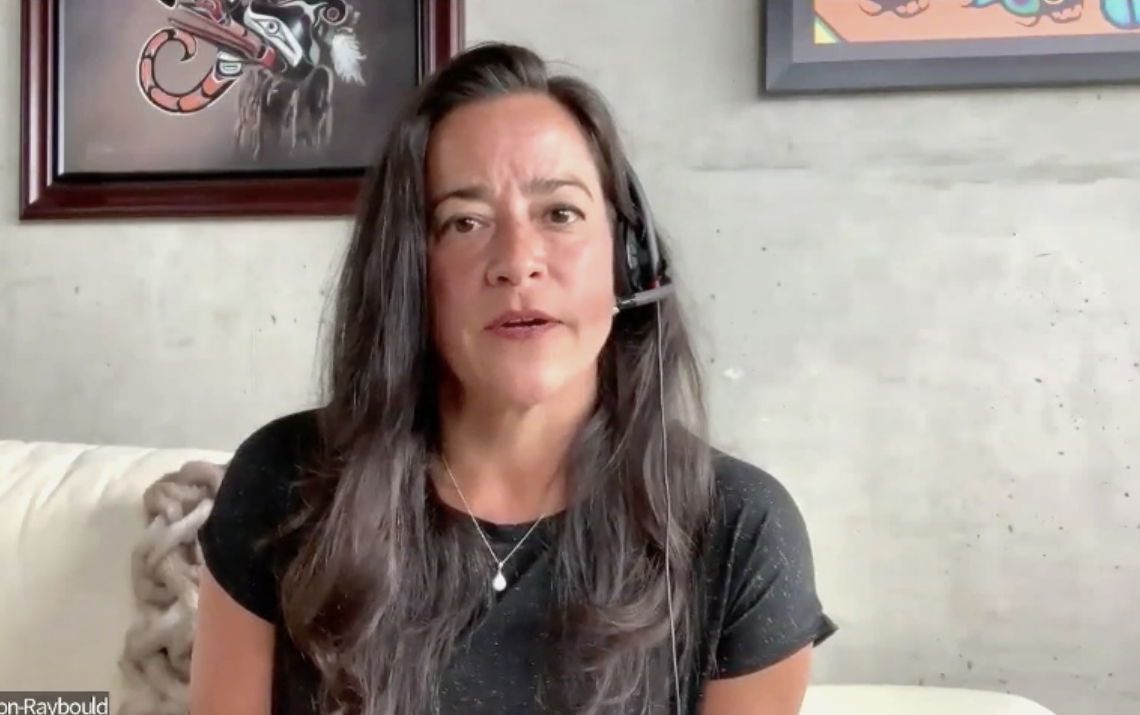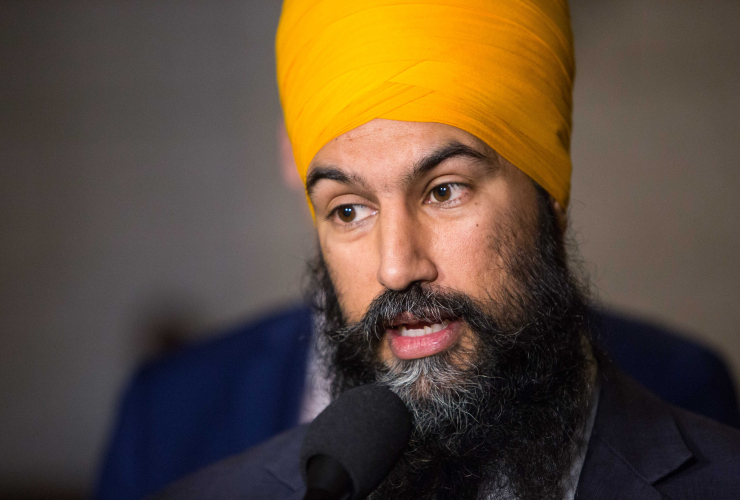Warning: This story contains details that may provoke distress or trauma in some readers.
Jody Wilson-Raybould endured a salvo of emotions as news broke confirming the unmarked graves of 215 children at the Kamloops Indian Residential School at Tk’emlúps te Secwépemc.
The Independent MP for the riding of Vancouver Granville, former justice minister, and member of the We Wai Kai Nation was in her home community on Quadra Island, B.C., when she heard.
The initial surge of incredible sadness was pursued by increasing anger and a fixed sense of frustration.
Every Indigenous person in Canada would be experiencing a reverb effect of pain, she realized, as few escape the direct or intergenerational heartache tied to the legacy of residential schools.
She also thought of elders and leaders who’d been advocating for justice and reconciliation around residential schools for decades.
“It didn't have to be this way,” Wilson-Raybould said.
“There could have been more work — transformative work — that could have been well underway.
“My frustration comes from knowing and understanding that this government promises so much. And has done so little.”
Prime Minister Justin Trudeau has failed to make real progress on his promise to radically shift Canada’s relationship with Indigenous people, and create the legal framework to recognize and implement their rights, Wilson-Raybould said.
Canada’s first Indigenous attorney general, Wilson-Raybould resigned from the Liberal cabinet in 2019 during the SNC-Lavalin scandal after she accused Trudeau and his government of political interference over her decision to prosecute the Quebec engineering giant on fraud and corruption charges. The federal ethics watchdog ultimately ruled Trudeau interfered in the case.
“As a (former) minister of the Crown, I have a deep understanding about what this government has promised,” she said.
The graves at Tk’emlúps te Secwépemc are shocking, but not surprising, said Wilson-Raybould — not to most Canadians, and certainly not to Indigenous Peoples.
The Truth and Reconciliation Commission of Canada (TRC) heard thousands testify over six years and reported in depth in 2015 on missing children and unmarked burials.
“TRC reports, particularly the fourth volume, spoke about this at length,” she said.
“We know there are more mass or unmarked graves that are going to come to light.”
The graves in Kamloops were verified days before the anniversary of the TRC’s Calls to Action.
Yet six years later, the fundamental questions around children posed by the TRC are unanswered.
Who went missing or died? How many? Why or how? And where are they buried?
“It’s dangerously misleading for the government to say that they have fulfilled 80 per cent of the TRC’s Calls to Action, or that they're well underway,” said Wilson-Raybould.
“While the government has done some things and invested money — which, of course, is necessary — we can’t say that having meeting after meeting, or creating a process after process, is substantial.
To date, the federal government has yet to develop a federal strategy for the ongoing identification of more burial sites.
Wilson-Raybould questioned the Liberals in Parliament this week about their commitment to dismantle the Indian Act, the legal framework that led to the deaths of residential schoolchildren and continues to reinforce the colonial relationship between Canada and Indigenous people today.
“Will the prime minister do what is needed and establish a legal framework for mass and unmarked graves that meets human rights norms, including ensuring all records are kept and released, sites protected and criminal investigations conducted so that families can heal and are appropriately compensated?” she asked.
Crown-Indigenous Relations Minister Carolyn Bennett chose not to answer the questions directly, but did take the time to dispute the term mass grave.
The federal government is reaching out to communities, with the support of the National Centre for Truth and Reconciliation, to make sure all other communities will be able to find their lost children, Bennett said.
“We will make sure that this is done in a proper and legal way,” she said.
Trudeau has also promised to take his lead for further action on residential schools from Indigenous nations, in addition to issuing a call to the Pope to apologize for the role of the Catholic Church in the harms of residential schools.
However, the onus does not fall to First Nations or the Catholic Church to dismantle the Indian Act and the colonial framework that has violated and continues to violate the rights of Indigenous Peoples, Wilson-Raybould said.
“Of course, we have to take the lead from Indigenous Peoples in terms of what's appropriate, and what they want to do with respect to the children and the graves found,” she said.
“Of course, the Pope should apologize,” she added.
“But government cannot use the need for Indigenous people to take the lead as an excuse to do nothing.”
Trudeau needs to act on his commitment to create transformational change and space for self-government and allow Indigenous nations to rebuild in line with the principles of the United Nations Declaration on the Rights of Indigenous Peoples (UNDRIP), Wilson-Raybould said.
“The Indian Act still exists, and it still controls the lives of Indigenous Peoples. It's racist, and we need to have a mechanism to move beyond it,” she said.
That doesn’t mean abandoning important calls to action around residential schools, justice for missing, murdered Indigenous women and girls (MMIWG), or funding for either of those objectives, she added.
“The way we're going to transform the relationship is to transform the way that the federal government looks upon Indigenous Peoples as being lesser,” Wilson-Raybould said.
“We need to look at it as a relationship built on mutual trust, respect and dignity, and that Indigenous Peoples have rights.
“And until the government stops offloading its responsibility, nothing is going to change.”
The Indian Residential School Crisis Line provides support for people who attended and/or are affected by the trauma of residential schools. Those seeking emotional and crisis referral services can call the 24-hour national crisis line at 1-866-925-4419.
Rochelle Baker / Local Journalism Initiative / Canada’s National Observer
She is correct with respects
She is correct with respects to the history of the federal government's handling and hiding the racism against indigenous peoples and we are way past time to bring it front and center.
IMO she is the wrong person to be bringing this message. She refused to be a minister in Trudeau's cabinet that would have had the most direct, powerful influence on making those changes and she revealed herself to be less than trustworthy as a colleague.
Rubbish.
Rubbish.
The evidence is that JWR was pushed out by blatant political interference over SNC Lavelin corruption while she was upholding the higher principles of independence her position as AG dictates. By succumbing to the interference merely to appear as a "team player" means that JWR would have sacrificed said principles to become a partisan Liberal Party aparatchik that kowtows to its donors (i.e. SNC) over the independence of her office and overriding public interest.
SNC does not run the country.
The outcome of the
The outcome of the prosecution of SNC Lavalin, which Ms. Wilson-Raybould and her Chief Prosecutor insisted on pursuing, was that SNC got off essentially scott-free. By comparison, the remediation agreement that the Prime Minister proposed would have involved an admission of guilt, provisions to remediate the damage and the possibility of future prosecution if the company did not live up to its commitments. More careful study by the former AG along with a willingness to discuss the matter openly with her cabinet colleagues would likely have led to a more appropriate outcome.
I find your response rubbish.
I find your response rubbish. She secretly recorded a colleague and then released said recording without his consent. She was part and party to undermining the federal government without understanding the situation and options she had in her power to implement. Had she implemented them, SNC top corporate would have truly been punished. Now a whole bunch of people lost their jobs who had nothing to do with it.
I voted for Jody Wilson
I voted for Jody Wilson-Raybould twice. Once to get get rid of Harper, and another time to keep pipeline parties from taking over my riding. The results (turfing the angry man and downgrading the kid brimming with breathless rhetoric and little action to a minority government) were perfect. However, I was disappointed to see her disappear into the ether for a year and wondered out loud how this will bear out at the next election, but that could be chalked up to the lack of a voice independent MPs have in Ottawa.
She has found her voice again on an extremely relevant issue. Her op-ed in last Saturday's Globe and Mail was at once very poignant and positive, in that she illuminated the path forward on reconciliation, as she did in this interview. It starts with dismantling the hopelessly outdated and notoriously damaging Indian Act. No one else, to my knowledge, has provided a road map for a complete renewal of Canada's relationship with its Indigenous people. She literally wrote the book with her husband. She has also called out Trudeau and his government more than once for its pathetic weak-kneed response to several issues. Reconciliation is at the top of the list. Her critique applies equally to all political parties.
JWR has found her public voice again. I am proud to have supported her as my MP and will do so again as long as she keeps up her written commentary and constructive criticism in various media, which is now her most effective outlet.







Comments